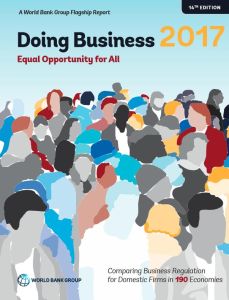Join getAbstract to access the summary!

Join getAbstract to access the summary!
World Bank Group
Doing Business 2017
Equal Opportunity for All
World Bank, 2016
What's inside?
Government regulation of businesses can help or hurt their success.
Recommendation
The 14th edition of the World Bank’s annual flagship report, Doing Business 2017, presents measures of regulatory governance for 190 national economies. It assesses 11 categories important to business, including starting and operating a successful enterprise, as well as providing analyses of labor rules and government procurement processes. As found in previous editions of this study, nations that adopt transparent, equal-access, streamlined and pro-growth regulatory policies boost their business output, while countries that impose Byzantine rules undermine economic development. getAbstract recommends this useful work to policy makers and entrepreneurs interested in an authoritative source of information about business regulatory environments around the world.
Summary
About the Author
The World Bank provides financial and technical assistance to developing countries.

























Comment on this summary